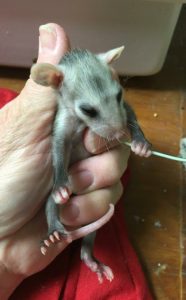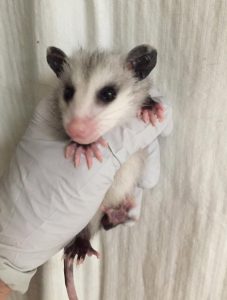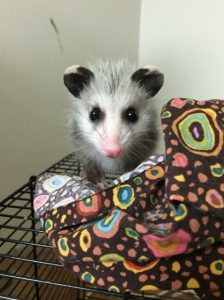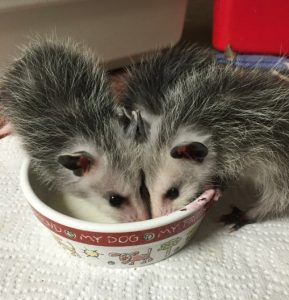By the end of October, Irvine is hoping to welcome the newest member of the education animal family: one of the furry, warm blooded variety!
This young opossum will be coming to live at the nature center because she has been human raised from a very young age. She was orphaned, along with her two brothers, when her mother was unfortunately hit by a car earlier this summer. Despite the odds being against them, the babies survived and are thriving under the care of dedicated rehabilitators at the Phoenix Wildlife Center.
- August 16th, 2015
- September 4, 2015
The opossum is possibly one of the most misunderstood native mammals found in Maryland.
Most people think of them as dirty, aggressive, unwanted visitors raiding their trash cans in the middle of the night. It is true that they are often found living in close proximity to humans, but the opossum is best adapted for living in the forest! The have a prehensile tail, like some monkeys, that acts as an extra “hand” to hold onto branches as they climb trees, and their back feet actually have a large opposable thumb-like toe for excellent gripping.
Their affinity for digging through our trash comes from the fact that they are omnivores–they will eat just about anything! In the wild, they generally feed on plants, fruits, insects, worms, and other small animals. And despite being thought of as dirty disease carriers, they are one of very few mammals that are extremely resistant to rabies!
The opossum is also the only marsupial found in North America! Marsupials are a group of mammals that give birth to very underdeveloped young, which they carry around in a pouch on their bodies until they are ready to be out on their own–like kangaroos and koalas!
- September 15, 2015
- The female & her two brothers eating
Several opossums have called Irvine home over the years as exhibit and education animals.
Unfortunately, like many other marsupials, they do not have a very long lifespan. In the wild, opossums generally live less than 2 years and in captivity they can sometimes survive to 3 or 4.
Irvine animal care staff have been receiving updates on the growth and health of the babies over the past two months. We will officially take over care of the little female when she is eating solid foods on her own, and then the process of introducing her to her new role as an educational ambassador for her species will begin!




